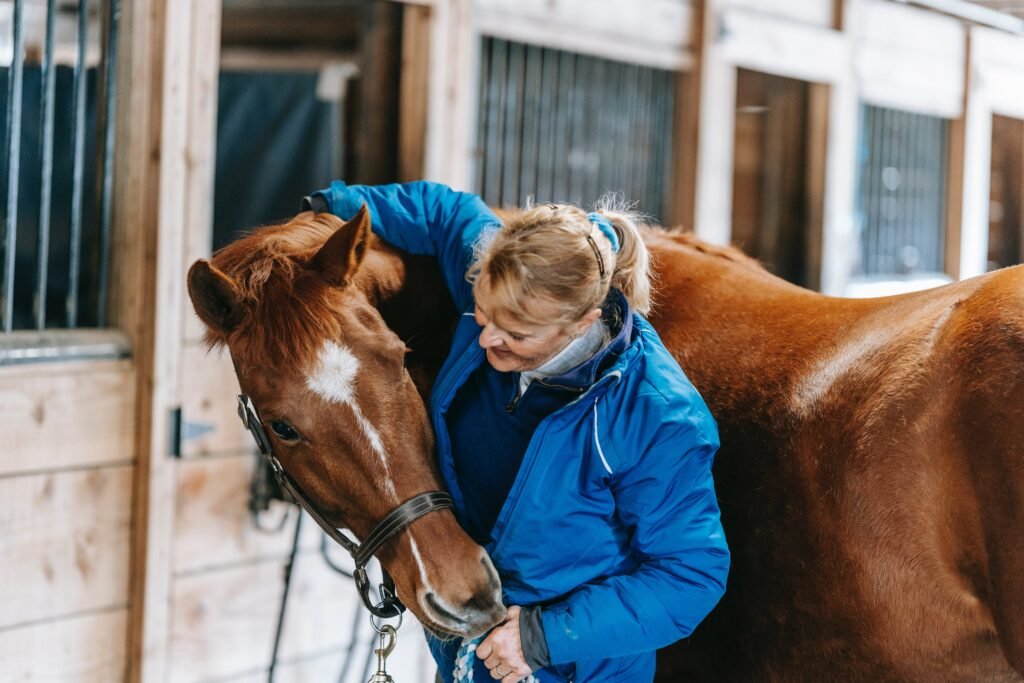Do you love horses and dream of turning that passion into a successful business? If you’ve ever thought about starting a horse boarding business, you’re in the right place. This comprehensive guide will walk you through the essential steps to make your love for horses a rewarding business venture.
Table of Contents
- What Is The Horse Boarding Business?
- Steps on How to Start a Horse Boarding Business
- Passion and Research
- Choose a Catchy Business Name
- Create a Solid Business Plan
- Make It Legal
- Analyze the Competition
- Costs to Start a Horse Boarding Business
- Laws for Horse-horse-boarding businesses?
- Pick the Perfect Spot
- Tell Everyone About Your Business
- Client Relationships
- Engage with the Horse Community
- Enhance your business
- What Are the Benefits of Starting a Horse Boarding Business?
- Conclusion: How To Start A Horse Boarding Business
- FAQ
What Is The Horse Boarding Business?
A horse boarding business provides care for horses owned by individuals who lack the space, time, or expertise to manage their horses independently. Typically located on expansive properties with pastures, barns, and amenities, these businesses offer various levels of horse care, including feeding, exercise, and overall well-being. Some facilities may also offer additional services such as riding lessons, grooming, and veterinary care. Successful horse boarding businesses prioritize the health and happiness of their equine residents, ensuring they receive proper nutrition, exercise, and attention. They also provide a safe and comfortable environment for horse owners to leave their beloved animals.
Steps on How to Start a Horse Boarding Business
1. Passion and Research
Starting a horse boarding business requires a genuine love for horses as the foundation. If you have that passion, the next step is to conduct thorough research. This includes understanding the horse industry, local regulations, and the needs and desires of potential clients.
- Industry Research: Explore the intricacies of the horseboarding business to make informed decisions and develop a business strategy that caters to market demands and complies with legal requirements.
- Local Regulations: Familiarize yourself with zoning regulations, environmental laws, and animal welfare standards in your area to ensure your business operates legally and ethically.
- Competitor Analysis: Identify existing horse boarding businesses in your region to understand their strengths, weaknesses, and unique offerings. This allows you to position your business effectively and meet market needs.
- Customer Needs: Research the needs of horse owners in your area to tailor your services accordingly. Consider the types of facilities, services, and amenities that would be most valuable to your target audience.
2. Choose a Catchy Business Name
Before you file any paperwork or create a website, choose a unique and memorable name for your business. This crucial decision should be carefully considered, as the name you choose will influence how your target customers perceive you and set the tone for your brand.
- Easy to Say and Remember: Opt for a name that is easy to pronounce and recall, making it easier for potential customers to find and remember your business.
- Unique and Distinctive: Choose a name that stands out from the competition and reflects the unique character and offerings of your business.
- Brand Representation: Ensure the name aligns with your brand identity and values, conveying the essence of your horse boarding business.
3. Create a Solid Business Plan
A detailed and well-structured business plan is essential for the success of any new business. This plan serves as a roadmap for success, outlining key elements that will guide your business’s growth.
- Executive Summary: Clearly and concisely state the purpose and objectives of your startup. This step helps you clarify your vision and provides a framework for tracking your progress.
- Market Analysis: Identify your target audience, understanding their demographics, interests, and behavior. This knowledge allows you to create products or services that cater to their needs, increasing the likelihood of customer acquisition.
- Products and Services: Outline the various services your startup will offer and differentiate them from competitors. Clearly explain the value proposition of your offerings and how they address customer pain points.
- Pricing Strategy: Develop a fair pricing structure that aligns with customer expectations, reflects the value of your services, and ensures long-term profitability for your business.
- Financial Projections: Create detailed financial forecasts, including income statements, cash flow projections, and balance sheets. This step helps you understand the financial viability of your business and secure funding if necessary.
4. Make It Legal
Starting a successful horse business requires careful attention to legal requirements and regulations.
- Zoning Compliance: Conduct thorough research to ensure your chosen location complies with zoning regulations and permits horse boarding businesses.
- Permits and Licenses: Obtain all necessary permits and licenses from relevant authorities, such as local government or environmental agencies, to ensure your business operates legally.
- Insurance: Secure comprehensive insurance coverage that addresses the specific risks associated with running a horse boarding business. This could include liability insurance, property insurance, and equine insurance to protect your assets and business operations.
5. Analyze the Competition
Before launching your horse boarding facility, it’s crucial to understand the competitive landscape. This involves visiting local stables and researching them online.
- Local Visits: Visit all nearby boarding facilities within a 20-mile radius of your intended location. Note key information such as amenities, pricing, promotions, and events.
- Online Research: Explore competitor websites, read reviews on platforms like Yelp and Facebook, and monitor their social media presence. Analyze their follower count, engagement, and content strategy.
- Google Alerts: Set up Google Alerts to receive notifications about competitor activities and stay informed about their latest developments.
- Website Analysis: Carefully examine competitor websites, noting their design, content, and user experience.
This competitive analysis will help you identify your unique selling proposition and develop strategies to differentiate your business.
6. Costs to Start a Horse Boarding Business
Starting a horse boarding facility requires significant upfront investment. The initial costs can range from $300,000 to $1 million, covering expenses such as property purchase or lease, barn construction, fencing, equipment, and horse supplies.
- Monthly Operating Costs: Monthly expenses for horse care, employee salaries, and other operational costs can range from $15,000 to $60,000.
- Marketing and Community Events: Companies typically spend $5,000 to $15,000 annually on marketing and community outreach initiatives.
High-quality facilities that charge $1,000 per month per horse can generate substantial revenue. However, careful financial management and expense control are essential for long-term sustainability.
7. Laws for Horse-horse-boarding businesses?
Operating a horse boarding facility in the United States involves adhering to county and state regulations regarding land use and development. Certain areas may have zoning restrictions that limit the types of businesses allowed in specific zones, including horse boarding facilities.
- Zoning Compliance: Consult with your local zoning department to ensure your chosen location complies with zoning ordinances.
- Environmental Regulations: Follow environmental regulations regarding waste management and disposal.
- Health and Safety Guidelines: Adhere to health and safety guidelines for animal welfare and facility cleanliness.
- Specific Requirements: Some areas may require specific permits, licenses, or insurance to operate legally.
8. Pick the Perfect Spot
Choose a location that offers ample space for horses to roam, play, and exercise without restrictions. It’s also essential to ensure easy accessibility for horse owners and visitors.
- Space and Amenities: Select a property with sufficient acreage for pastures, barns, and other amenities that meet the needs of your target audience.
- Accessibility: Choose a location that is easily accessible by road and has adequate parking facilities.
- Zoning and Regulations: Ensure the location complies with all relevant zoning and regulatory requirements.
9. Tell Everyone About Your Business
Boost your business visibility by creating a professional website, utilizing social media to share special offers and promotions, and generating excitement during your launch with introductory deals.
- Website: Develop a user-friendly website that showcases your services, facilities, and pricing.
- Social Media: Engage with your target audience on social media platforms, sharing updates, promotions, and behind-the-scenes content.
- Community Outreach: Participate in local horse events, sponsor events, and partner with other horse-related businesses to expand your reach and build relationships.
10. Client Relationships
Building strong relationships with horse owners is crucial for the success of your business.
- Excellent Customer Service: Provide exceptional customer service, ensuring open communication and going the extra mile to meet their needs.
- Horse Care: Prioritize the well-being of your equine residents, providing high-quality care and attention.
- Client Satisfaction: Aim for high client satisfaction, as satisfied customers are more likely to refer others and remain loyal clients.
11. Engage with the Horse Community
Participate in local horse events, support and collaborate with other horse-related businesses to increase your visibility and stay informed about industry trends.
- Event Participation: Attend and participate in local horse shows, clinics, and other events to connect with potential clients and build brand awareness.
- Sponsorships: Sponsor local horse events to associate your business with the excitement and community spirit of the equine world.
- Partnerships: Collaborate with other horse-related businesses, such as veterinarians, farriers, and trainers, to offer bundled services and expand your network.
12. Enhance your business
To thrive in the horse boarding business, stay updated on industry trends and client needs.
- Feedback: Cultivate a culture of open feedback, viewing it as a valuable tool for improvement.
- Adaptability: Be flexible and adaptable, adjusting your services to meet evolving customer demands and industry changes.
- Continuous Improvement: Commit to continuous improvement, exploring new ideas, implementing innovative technologies, and enhancing the customer experience.
What Are the Benefits of Starting a Horse Boarding Business?
Starting a horse boarding business can be a rewarding and profitable venture with numerous advantages.
- Financial Opportunity: Horse owners are willing to pay a premium for quality care, and additional services like training and grooming can generate significant revenue.
- Passion Project: It provides a chance for animal lovers, particularly those passionate about horses, to work closely with these magnificent creatures and build strong bonds with both the animals and their owners.
- Community Impact: This type of business contributes positively to the local community by providing a safe and healthy environment for horses while their owners are away.
In essence, starting a horse boarding business can be a financially rewarding and personally fulfilling experience, allowing you to combine your love for horses with the satisfaction of helping others.
Conclusion: How To Start A Horse Boarding Business
In summary, starting a horse boarding business requires a combination of passion, meticulous planning, and adherence to industry regulations. Begin by conducting thorough research and developing a comprehensive business plan. Choose a memorable business name and address legal requirements.
- Marketing: Implement effective marketing strategies, including online presence, social media engagement, and community outreach.
- Financial Management: Carefully manage finances, considering both initial and ongoing expenses.
- Client Relationships: Build strong relationships with horse owners through exceptional customer service, high-quality horse care, and client satisfaction.
- Community Involvement: Engage with the horse community through event participation, sponsorships, and partnerships.
- Continuous Improvement: Embrace a culture of open feedback, adaptability, and continuous improvement to ensure your business remains competitive and successful.
By leveraging your love for horses and applying smart planning, you can transform your passion into a thriving business that fulfills your goals and contributes positively to the horse community. Good luck with your horse boarding business!
FAQ
What Is A Horse Boarding Business?
A horse boarding business offers a place and services for horse owners to keep and take care of their horses. Owners pay a fee for the accommodation and services provided, which typically include feeding, stall cleaning, and access to riding and turnout areas.
Why Should I Start A Horse Boarding Business?
Starting a horse boarding business can be a rewarding venture for individuals who love horses. It allows you to work with animals, help horse owners, and earn a living from your passion.
What Are The Key Considerations Before Starting A Horse Boarding Business?
Key considerations include location, zoning regulations, facility requirements, insurance, and understanding the needs of horses and their owners. Conduct thorough market research to assess demand and competition in your area.
Do I Need Any Qualifications Or Experience To Start A Horse Boarding Business?
While formal qualifications are not mandatory, experience in horse care, stable management, and basic horse first aid is beneficial. It is also essential to have business acumen, customer service skills, and knowledge of local regulations.
What Are The Legal Requirements For Starting A Horse Boarding Business?
Legal requirements vary by location. Some common considerations include zoning compliance, obtaining a business license, securing insurance coverage for accidents, and adhering to animal welfare regulations. Consult with local authorities and legal professionals to ensure compliance.
Let’s keep the conversation going! Share your thoughts and questions in the comments below. And don’t forget to share this article with fellow horse enthusiasts!







